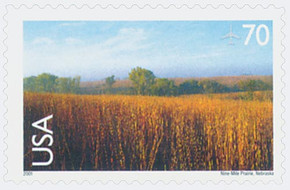
U.S. #C133
1999 48¢ Niagara Falls
Scenic American Landscapes
Issue Date: May 12, 1999
First City: Niagara Falls, New York
Quantity Issued: 100,750,000
Printed by: Avery Dennison
Printing Method: Photogravure
Perforation: Serpentine Die Cut 11
U.S. #C133
1999 48¢ Niagara Falls
Scenic American Landscapes
Issue Date: May 12, 1999
First City: Niagara Falls, New York
Quantity Issued: 100,750,000
Printed by: Avery Dennison
Printing Method: Photogravure
Perforation: Serpentine Die Cut 11
Color: Multicolored
This stamp was issued in 1999 to pay the international postage rate. It is the first stamp in the Scenic American Landscapes Series. The stamp features a photo of the American Falls taken from the New York shoreline by nature photographer Kurt Ross. To the left of the stamp’s denomination is the stylized silhouette of a jet, which indicates it was intended to satisfy an airmail or international rate.
Birth Of Nikola Tesla
Nikola Tesla was born on July 10, 1856, in Smiljan, Austrian Empire (present-day Croatia).
The fourth of five children, Tesla discovered as he attended school that he had an eidetic memory – meaning he was able to retain more information and for longer than his fellow students. This sometimes got young Tesla in trouble as his teachers thought him to be cheating.
In 1875, Tesla attended Austrian Polytechnic, a higher education school in Graz, Austria. Tesla did well in his first year, but later became addicted to gambling and his success faltered. He left the school in 1878. In 1880, Tesla went to several lectures at Charles-Ferdinand University in Prague – he had been too late to formally enroll in the college.
After leaving Prague, Tesla worked at a telegraph company in Budapest before moving to France in 1882 and working for the Continental Edison Company. In June 1884, he immigrated to the United States a letter to Edison from respected inventor Charles Batchelor. Batchelor wrote, “I know two great men; one is you (Edison) and the other is this young man.” Edison hired Tesla to work for him in New York City. The two worked well together for about a year but broke ties when Edison refused to pay Tesla a promised amount after he improved several of Edison’s motors and generators.
Tesla then joined up with two businessmen to create Tesla Electric Light and Manufacturing. He filed several patents, all of which he gave to the company. However, his partners then decided they wanted to focus on just supplying electricity and they established a new company, leaving Tesla with nothing. To pay the bills, he reportedly worked as a ditch digger for $2 day, though he was distraught that his talent was going to waste.
Then in 1887, Tesla met two investors who gave him the funding to create the Tesla Electric Company in Manhattan. While working there, he developed the groundbreaking alternating current induction motor. He so impressed the Westinghouse Company, they agreed to license the technology and pay him up front. However, Westinghouse later convinced Tesla to sell them the patents for a single sum, which likely prevented Tesla from making a fortune.
In 1893, Tesla helped supply the power to the World’s Columbian Exposition in Chicago. He illuminated more light bulbs than could be found in all of Chicago. He also entertained audiences with several spectacles, including an electric light with no wires. Tesla would later help Westinghouse win a contract to generate electrical power at Niagara Falls, creating the first large-scale AC power plant in the world.
Despite his brilliance, Tesla endured hardships. A fire destroyed his Manhattan lab in 1895, taking with it his notes and prototypes. And when he demonstrated wireless control of a boat, many claimed it was a hoax. Tesla then explored the wireless transmission of electric power. He believed he could provide wireless electricity and communication around the world. Tesla also claimed to have plans to create a motor that ran on cosmic rays, had discovered a technique for photographing thoughts and invented peace and death rays.
Tesla had made poor financial decisions for most of his life, so he spent his final years with little money. He died on January 7, 1943, in New York City. A brilliant inventor, engineer, and physicist, Tesla’s experiments and research changed the world. He designed what became our modern alternating current (AC) electricity, experimented with X-Rays and Radio waves, and improved many pre-existing technologies. He held 300 patents and could speak eight languages. Tesla developed so many important theories and advances that he is called the “Father of Physics.”
















